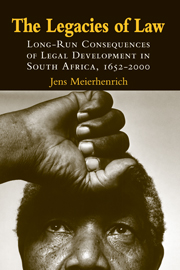Book contents
- Frontmatter
- Contents
- List of Figures
- List of Tables
- List of Cases
- Preface and Acknowledgments
- The Legacies of Law
- 1 Introduction
- PART I A THEORY OF LAW
- PART II A HISTORY OF LAW
- 4 Apartheid and the Law I
- 5 Apartheid and the Law II
- 6 Apartheid's Endgame and the Law I
- 7 Apartheid's Endgame and the Law II
- PART III A COMPARATIVE ANALYSIS
- 9 Conclusion
- Bibliography
- Index
7 - Apartheid's Endgame and the Law II
Published online by Cambridge University Press: 18 December 2009
- Frontmatter
- Contents
- List of Figures
- List of Tables
- List of Cases
- Preface and Acknowledgments
- The Legacies of Law
- 1 Introduction
- PART I A THEORY OF LAW
- PART II A HISTORY OF LAW
- 4 Apartheid and the Law I
- 5 Apartheid and the Law II
- 6 Apartheid's Endgame and the Law I
- 7 Apartheid's Endgame and the Law II
- PART III A COMPARATIVE ANALYSIS
- 9 Conclusion
- Bibliography
- Index
Summary
This chapter picks up where the previous chapter left off. It demonstrates the difference that law, in particular South Africa's legal tradition, made in apartheid's endgame. And yet, as Edwin Cameron, a judge on the South African Supreme Court of Appeal, reminds us, “The survival of law and legal regulation in [South Africa] can by no means simply be assumed.”
LAW AS TRADITION
A legal tradition connotes “a set of deeply rooted, historically conditioned attitudes about the nature of law, about the role of law in society and the polity, about the proper organization and operation of a legal system, and about the way law is or should be made, applied, studied, perfected, and taught.” South Africa's legal tradition – this ideology of law – is an underappreciated factor in the country's transition to democracy (see also Figure 3.2). I have argued, throughout this book, that choices about cooperation and confrontation in democratization are crucially affected by the presence, or absence, as well as the nature of a legal tradition in newly democratizing countries. I believe that legal traditions, or legal ideologies, provide shared mental models that can, under the conditions specified in this book, help overcome uncertainty and bargaining predicaments. For as we saw Denzau and North claim in Chapter 2,
[u]nder conditions of uncertainty, individuals' interpretation of their environment will reflect their learning. Individuals with common cultural backgrounds and experiences will share reasonably convergent mental models, ideologies, and institutions; and individuals with different learning experiences (both cultural and environmental) will have different theories (models, ideologies) to interpret their environment.
- Type
- Chapter
- Information
- The Legacies of LawLong-Run Consequences of Legal Development in South Africa, 1652–2000, pp. 219 - 292Publisher: Cambridge University PressPrint publication year: 2008

